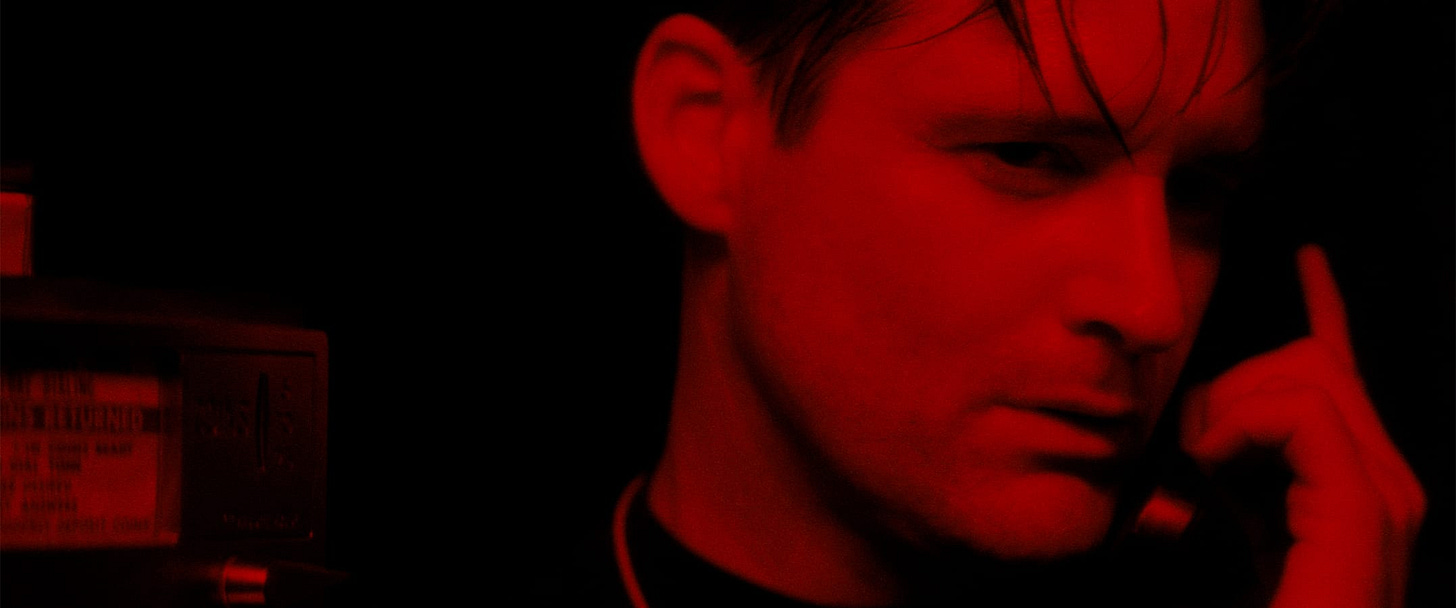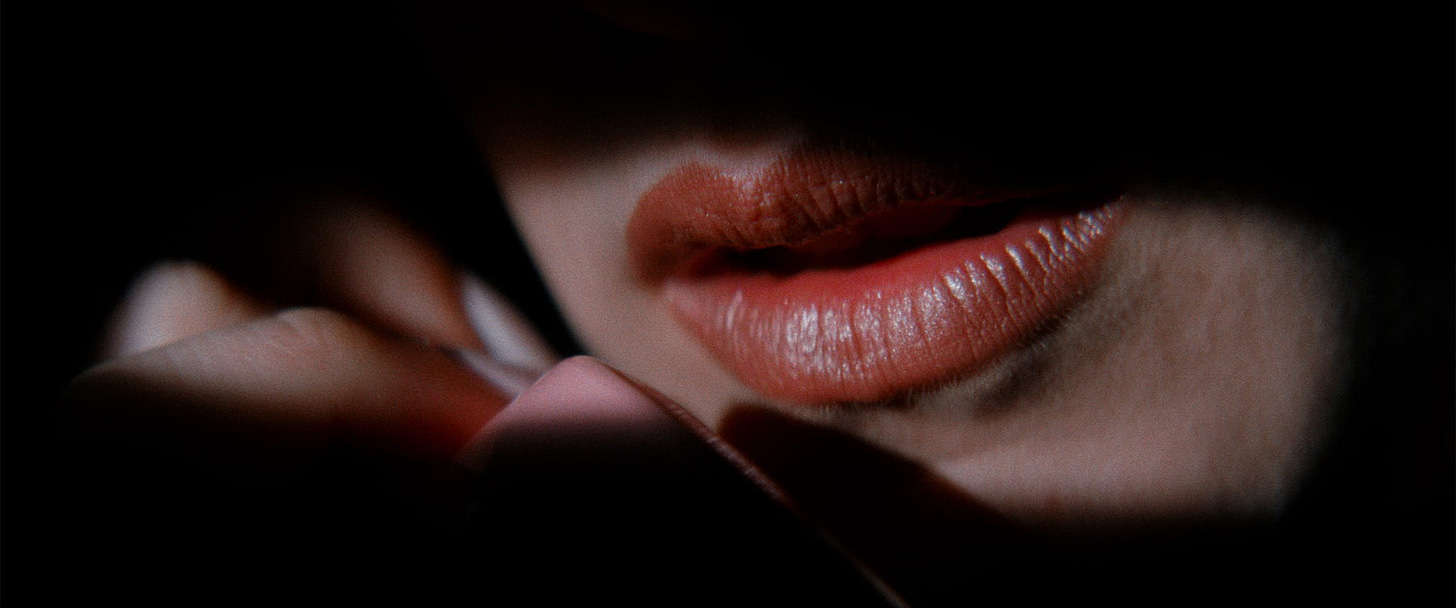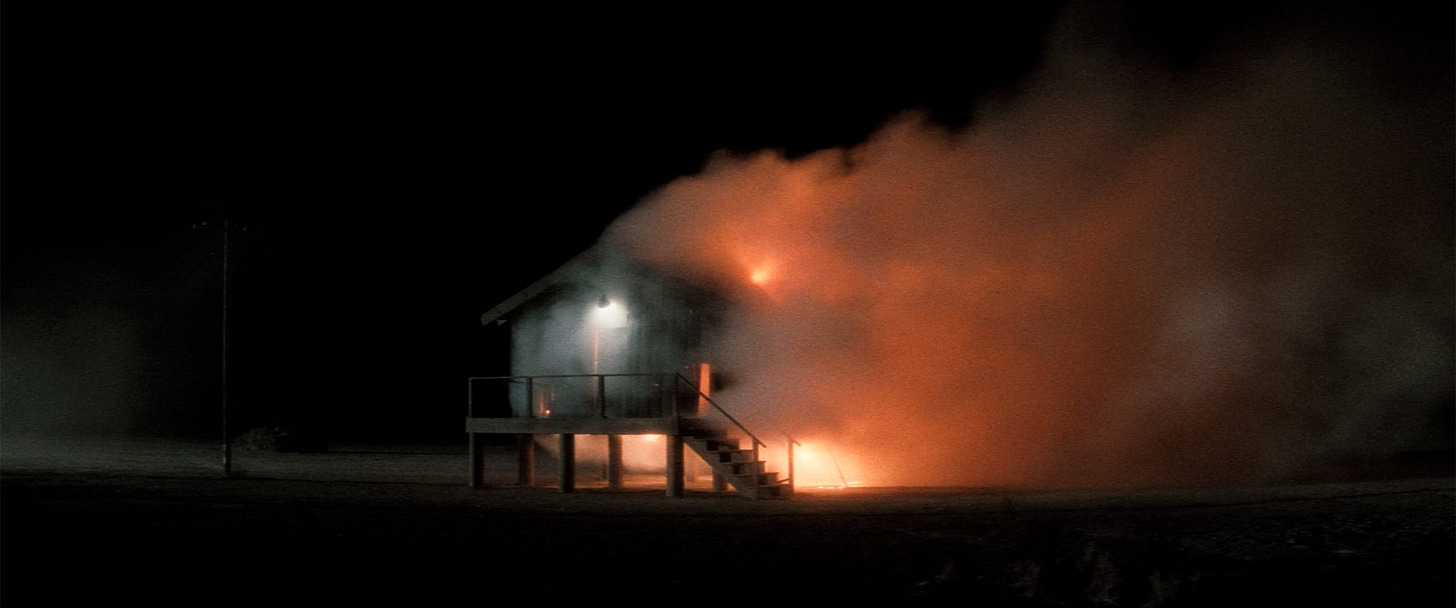No One Can Hear You Dream
A consideration of encounters with David Lynch and the sound of Lost Highway
This is a revised version of a piece published in March 1997.
Dark and disturbing, unrelenting and unsettling, sizzlingly sensual yet coldly fatalist, Lost Highway shows David Lynch ever more determined to escape the shackles of narrative convention, even after four years without finding finance for his projects. In fever-dream orchestration of incident, sound and music, Lynch has made a musical. After you've seen it, you find yourself humming—in your sleep.
In college, I got Lynch on the phone. That was our specialty—calling up filmmakers just making a name or sequestered in a canyon in California. Eraserhead already had a reputation, but it had no distributor and the campus film society wanted to show it. I was dispatched to hit the phones. We had done the same labor-intensive, pre-internet thing to inquire about The Day The Clown Cried with Jerry Lewis, who grew increasingly agitated down the line as we spoke.
I remember Lynch's gee-whiz voice on the phone, every bit the "Jimmy Stewart on Mars" Mel Brooks later called him after he produced The Elephant Man. He was a young man, a young David Lynch. But David Lynch nonetheless. He told me about newspaper routes and odd jobs and wondered how I had found him and his number and after some time realized he had to go out for smokes.
This time out, I fell victim to Lynch's PR-fade, missing chances to talk to him at the Sundance Festival after its debut there and over the phone before this week's release. It may be all to the better: In interviews, Lynch is elusive, never in a moment to pin down meaning, symbolism or directorial intent beyond what's right there onscreen, but also fond of saying things much like his characters would, such as that he's "lost in darkness and confusion." (An interview, also never to be, had been scheduled the week of the premiere of Mulholland Drive in Toronto, for the afternoon of September 11, 2001.)
On the night of Lost Highway's premiere in Park City, Utah, Lynch whirled through his own party on a cushion of hellos and smiles, his graying hair a constructivist event, spiky on one side and curled upward on the other. Much like the furniture he's constructed for his characters to languish against in Lost Highway in hillside houses of his making, Lynch was as much artifact as flesh.
With a second and third view, it grows more haunting, open to bright varieties of nightmarish interpretation. Lost Highway is the story of Fred Madison (Bill Pullman), who has a world of trouble boiling through his head over his feelings for his wife, Renee (Patricia Arquette)—jealousy, madness, rationalization, some large thing.
Whether taken as fantasy or nightmare, Lynch's noir yarn is as pungent as a punch in the face, as quixotic as revisiting a lost love; it's a romantic tragedy, with a deep undercurrent of sadness and hurt. Lynch and co-writer novelist Barry Gifford use minimal means to convince us that Fred could transform himself into another person out of emotional pain; the surfaces that the former painter composes while working through the plot are nothing short of ravishing. And yet... is the story banal, riddled with psychological clichés, or grandly mysterious?
A not-to-be-overlooked element in Lynch's mastery of mood—evading the subject of traditional narrative coherence entirely—is the use of sound. Robert Bresson once wrote that "the sound film invented silence," and Lynch intuitively understands the use of the pause, of silence, of distant, indeterminate noise. My interpretation of the mobius-strip structure of Lost Highway is that Fred Madison is caught in a nightmare he can't wake from, a sexually paranoid dream in which his wife has sex with every man she meets. As Madison becomes more paranoid, his personality shatters into several characters—young stud Balthazar Getty, who meets a woman much like Renee; old goat Robert Loggia, who possesses the second Renee already; and Robert Blake's Mystery Man, an enabling id-creature with eyes that burn into your soul.
Sound's the key. For twenty minutes, the tension between Fred and Renee grows. In a chicly furnished house of dark, interminable hallways and strange portents, the couple are cocooned in unspoken disharmony. One morning, a dog begins to bark. Fred becomes upset—"Who owns that damn dog?" (Much as one's dreams shift focus, influenced by external stimuli.) I ran that idea past Bill Pullman, who grinned and said, "That damn dog. Uh-huh. Tell me more."
Like the loopy line the late Jack Nance had in Wild at Heart, "My dog barks... late at night... sometimes," this seems to be the moment that the nightmare begins—the moment when the outside world begins to impinge on the claustrophobic space inside Fred Madison's head. Pullman smiles. "David isn't much for interpretations, but he might like that one."
There's a pattern of sound cues that build on this idea throughout the film. Lynch takes credit as sound designer, but entrusted much of the job to a newcomer, supervising sound editor Frank Gaeta. "David had very specific ideas about what the movie should sound like," Gaeta told me. "For a car crash, he would mouth the sound for me. 'Man, David,' I said, 'Let's just record your voice!'"
Lynch's instructions were specific. "I want to hear bubbles and gristle and the weight of the body pulling down on the bone," he told Gaeta, who got the job after cutting the sound on two scenes—Loggia's gangster berating a tailgater and a close-up of a moth banging against a light bulb. "Once I did that, he loved it."
Beyond Lynch's precise idea of how a film should sound as well as look, Gaeta credits the director with one unusual practice—music by Angelo Badalamenti and Barry Adamson and a drone composed by Trent Reznor were all there in advance. "I was doing sound effects around the drone," Gaeta says, "So you can't tell the music from the sound effects. I could be in the key that Trent was in; my effects could be tonal." Since most scores are composed at the very last moment, this is a rarity. "Sound is usually atonal. I was purposely trying to hit the key the music was in. And that gave us a beautiful marriage of sound and effects."






